
David Robert Jones, known professionally as David Bowie, was an English singer-songwriter and actor. A leading figure in the music industry, he is regarded as one of the most influential musicians of the 20th century. Bowie was acclaimed by critics and musicians, particularly for his innovative work during the 1970s. His career was marked by reinvention and visual presentation, and his music and stagecraft had a significant impact on popular music.
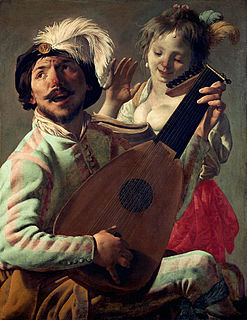
A duet is a musical composition for two performers in which the performers have equal importance to the piece, often a composition involving two singers or two pianists. It differs from a harmony, as the performers take turns performing a solo section rather than performing simultaneously. A piece performed by two pianists performing together on the same piano is a "piano duet" or "piano four hands". A piece for two pianists performing together on separate pianos is a "piano duo". The term duet is also used as a verb for the act of performing a musical duet, or colloquially as a noun to refer to the performers of a duet.

Iman Abdulmajid is a Somali fashion model, supermodel, actress and entrepreneur. A muse of the designers Gianni Versace, Thierry Mugler, Calvin Klein, Donna Karan and Yves Saint Laurent, she is also noted for her philanthropic work. She was married to rock musician David Bowie from 1992 until his death in 2016.

The discography of English singer-songwriter David Bowie (1947–2016) consists of 26 studio albums, 21 live albums, 46 compilation albums, 10 extended plays, 128 singles, 3 soundtracks and 12 box sets. Bowie also released 28 video albums and 72 music videos. Throughout his lifetime, Bowie sold roughly 140 million records worldwide. In 2012, Bowie was ranked ninth best selling singles artist in United Kingdom with 10.6 million singles sold. As of January 2016, Bowie has sold 12.09 million singles in Britain. In a period of 24 months since his death, 5 million records were sold in UK, 3.1 million singles and 2 million albums.
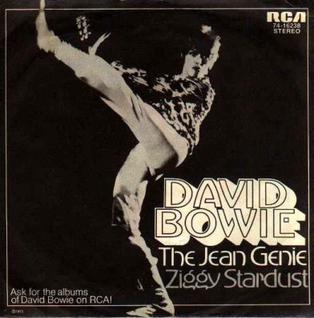
"The Jean Genie" is a song by English singer-songwriter David Bowie, originally released in November 1972 as the lead single to his 1973 album Aladdin Sane. Co-produced by Ken Scott, Bowie recorded it with his backing band the Spiders from Mars − comprising Mick Ronson, Trevor Bolder and Mick Woodmansey. According to Bowie, it was "a smorgasbord of imagined Americana", with a protagonist inspired by Iggy Pop, and the title being an allusion to author Jean Genet. One of Bowie's most famous tracks, it was promoted with a film clip featuring Andy Warhol associate Cyrinda Foxe and peaked at No. 2 on the UK Singles Chart.
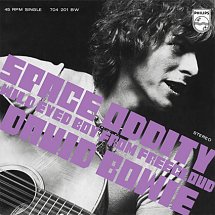
"Space Oddity" is a song that was written and recorded by English singer-songwriter David Bowie. It was first released on 11 July 1969 by Philips Records as a 7-inch single, then as the opening track of his second studio album David Bowie. After the commercial failure of his self-titled debut album in 1967, Bowie's manager Kenneth Pitt commissioned Love You till Tuesday, a promotional film that was intended to introduce Bowie to a larger audience. For the film, Bowie wrote "Space Oddity", a tale about a fictional astronaut named Major Tom; its title and subject matter were partly inspired by Stanley Kubrick's film 2001: A Space Odyssey (1968) and Bowie's feelings of alienation at that point in his career. Musically, "Space Oddity" was one of the most complex songs Bowie had written up to that point, and marked a change from the music hall-influenced sound of his debut to a sound that is akin to psychedelic folk and inspired by the music of the Bee Gees.

David Bowie is the second studio album by English musician David Bowie. After the commercial failure of his 1967 self-titled debut album, Bowie acquired a new manager, Kenneth Pitt, who commissioned a promotional film in hopes of widening the artist's audience. For the film, Bowie wrote a new song, titled "Space Oddity", a tale about a fictional astronaut. The song earned Bowie a contract with Mercury Records, who agreed to finance production of a new album, with Pitt hiring Tony Visconti to produce. Due to his dislike of the song, Visconti appointed engineer Gus Dudgeon to produce a re-recording for release as a lead single, while he produced the rest of the album.

"Blue Jean" is a song written and recorded by English singer-songwriter David Bowie for his sixteenth studio album Tonight (1984). One of only two tracks on the album to be written entirely by Bowie, it was released as a single ahead of the album and charted within the Top 10 in the UK and the United States, peaking at No. 6 and No. 8, respectively. The song is loosely inspired by Eddie Cochran.

Heathen is the 23rd studio album by English musician David Bowie. It was originally released in Europe on 10 June 2002, and the following day in America. After departing EMI/Virgin, it was his first release through his newly-formed ISO Records label, in conjunction with Columbia Records. It reunited Bowie with producer Tony Visconti, marking the two's first full-album collaboration since 1980's Scary Monsters. Recording mostly took place at New York studios from August 2001 to January 2002 and featured overdubs from several guest musicians, including Dave Grohl and Pete Townshend. Two tracks, including "Afraid" and "Slip Away" evolved from Bowie's shelved Toy album, while three were covers by Pixies, Neil Young and the Legendary Stardust Cowboy.
"The Man Who Sold the World" is a song by English singer-songwriter David Bowie. The title track of Bowie's third studio album, it was released in November 1970 in the US and in April 1971 in the UK by Mercury Records. Produced by Tony Visconti, it was recorded at Trident and Advision Studios in London in May 1970, towards the end of the album's sessions; Bowie recorded his vocal on the final day of mixing for the album, reflecting his generally dismissive attitude during the sessions. Musically, it is based around a "circular" guitar riff from Mick Ronson. Its lyrics are cryptic and evocative, being inspired by numerous poems including the 1899 "Antigonish" by William Hughes Mearns. Bowie's vocals are heavily "phased" throughout and have been described as "haunting".

"Do Anything You Say" is a single by English musician David Bowie, his first release solely credited to himself. Released by Pye Records on 1 April 1966, it was produced by Tony Hatch and featured contributions from his new backing band, the Buzz. The song failed to chart and has been negatively received by his biographers.
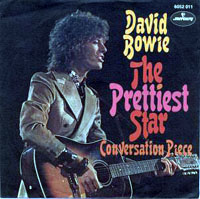
"The Prettiest Star" is a song by David Bowie, originally released as a single in March 1970.

"Crystal Japan" is an instrumental piece written by David Bowie and released as a single in Japan in spring 1980. It was recorded during the Scary Monsters sessions that year. The instrumental was used in a Japanese commercial for the shochu Crystal Jun Rock, which also featured an appearance by Bowie, although he said at the time that the track was not specifically written for this purpose. Originally titled "Fuji Moto San", it was apparently intended to close the Scary Monsters album until replaced by "It's No Game ".
"The Loneliest Guy" is a song written by David Bowie in 2003 for his album Reality. It's a slow-tempo minimalistic piece in which, according to James E. Perone, "Bowie's character also lives in denial: in spite of the shards of glass that he finds near his windows, the solitary life he lives, and 'all the pages that have turned,' he expresses the belief that he is not 'the loneliest guy' in the world, but, rather, 'the luckiest guy'." The biographer also writes: "The slow, solemn pace of the piece, the long phrases sung with a slowly pulsing vibrato suggest a profound sadness."
Nicholas Pegg is a British actor, writer and director. Educated at Nottingham High School and graduating with a Master of Arts in English Literature from the University of Exeter, Pegg subsequently trained at the Guildford School of Acting.

Toy is a posthumously released studio album by English musician David Bowie. It was recorded from July to October 2000 in New York City and featured re-recordings of songs Bowie recorded between 1964 and 1971, along with a couple of new tracks. The project was co-produced by Bowie and Mark Plati and featured musicians from Bowie's then-touring band—Plati, Earl Slick, Gail Ann Dorsey, Mike Garson and Sterling Campbell—with overdubs from Lisa Germano, Gerry Leonard and Cuong Vu.
Clareville Grove Demos is a box set EP by English musician David Bowie, released posthumously in May 2019. The set includes three 7" vinyl records containing six songs performed by Bowie with his friend John Hutchinson in early 1969. All songs in the collection are presented in mono, demo form. In November, all songs were released on CD on the Conversation Piece box set.
The 'Mercury' Demos is a box set by English musician David Bowie, released as a vinyl album in May 2019. It features ten songs in mono, demo form performed by Bowie with his friend John Hutchinson in early 1969. In November 2019, the compilation was released on CD as part of the Conversation Piece box set.
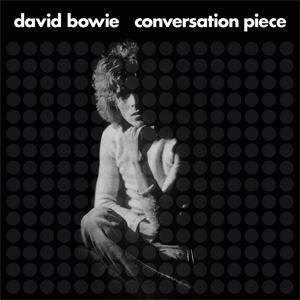
Conversation Piece is a box set by English musician David Bowie, released in November 2019, which contains five CDs featuring recordings made in 1968–1969. The box set includes home demos and BBC sessions, as well as two mixes of the 1969 album Space Oddity: the original 1969 stereo mix, and a new 2019 mix produced by Tony Visconti specifically for the set. The release of the 1969 mix is a repressing of the 2009 remastered CD, which was chosen due to its being mastered to match the original LP release, a priority that was not taken for Parlophone's in-house remaster created for the Five Years (1969–1973) box set in 2015.













